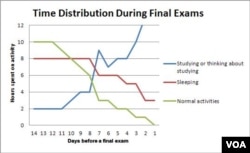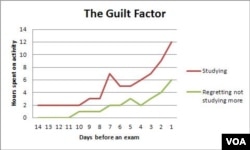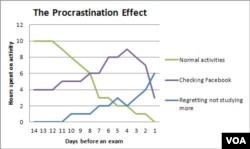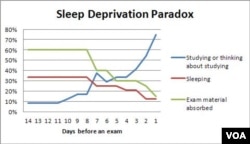With so little time left before the dreaded season of finals gets here, we take a scientific look at the radical changes observed in student behavior during this time of the year.
As final exams approach, the usage of time goes through dramatic changes and re-distributions. Most obviously, the amount of time spent doing regular activities decreases significantly as finals get closer. The impacted activities can include, but are not limited to, actually going to class, exercise, watching movies or TV, spending time with friends and, in some extreme cases, eating.
When finals still seem blissfully far away, the student splits their time largely between sleeping and performing regular activities (including going to class). But as exams get closer, you can see that both of those activities drop off dramatically, replaced by an increase in time studying or thinking about doing so.
The Guilt Factor
The following graph shows the complex interaction between actually studying and thinking about it. As time spent studying goes up, there is a correlating increase in regretting not studying more.
We call that “the guilt factor.”
The guilt factor is a mixture of emotions that combines awe, spurred by the vast amount of material that must be absorbed for the exam, and the sense of despair that comes from the sudden scarcity of the most valuable asset in this situation, time. This guilt factor contributes to a spike in study time about a week before finals. But, after realizing that a week is not “super close,” as students usually refer to the timeframe when studying is vital, studying is quickly replaced again by procrastination and regretting not studying.
The Procrastination Effect
Which brings us to another interesting, and also counterproductive, trend that we can observe in student behavior - the time dedicated to checking Facebook (this may also include other popular sources of online time-wasting such as Twitter, YouTube, Reddit, or Tumblr among others). As time starts to run out and students decrease their time doing normal activities in order to apply themselves more in academia, the time wasted online shows a suspicious correlating spike.
This occurs due to what we call the “procrastination effect.” As finals approach, the student decides to shut himself in an environment that will help him study by keeping him away from his other activities. Most universities don’t have classes during the week of final exams, so that students can have extra time to study.
But, with the day still not seeming “super close,” the enterprising student finds other ways to procrastinate with the tools at hand – his computer.
Note how right at the end the guilt factor finally takes over and the student finally abandons this activity in favor of actually studying. It’s the only positive effect the guilt factor produces.
The Sleep Deprivation Paradox
One of the most common side effects of final exams season is sleep deprivation. Here you see that the student typically has healthy sleeping habits, dedicating about a third of the day to their bed. But as finals approach, sleep becomes an ill-afforded luxury, and this time is rededicated to studying for what is coming up.
Fortunately, the student is also reducing hours spent on other activities during this time period, so sleep does not have to be given up entirely. Nevertheless, this lack of sleep results in the “sleep deprivation paradox” – as a student reduces their sleep per night, the effectiveness of their studying begins to decline as well. The factor of this effect is different for each student, but it’s fair to say that most students go beyond the optimal point and into the region of diminishing returns.
We cannot help but conclude that, between the guilt factor, the procrastination effect and the sleep deprivation paradox, the student is not exactly engaging in the best of behaviors during this difficult season.
But all is not lost. There are a lot of resources, including on this blog, to help you make better choices and get through this challenging period.
Main conclusion being, do as I don’t and you will succeed. Good luck on finals!
As final exams approach, the usage of time goes through dramatic changes and re-distributions. Most obviously, the amount of time spent doing regular activities decreases significantly as finals get closer. The impacted activities can include, but are not limited to, actually going to class, exercise, watching movies or TV, spending time with friends and, in some extreme cases, eating.
When finals still seem blissfully far away, the student splits their time largely between sleeping and performing regular activities (including going to class). But as exams get closer, you can see that both of those activities drop off dramatically, replaced by an increase in time studying or thinking about doing so.
The Guilt Factor
The following graph shows the complex interaction between actually studying and thinking about it. As time spent studying goes up, there is a correlating increase in regretting not studying more.
We call that “the guilt factor.”
The guilt factor is a mixture of emotions that combines awe, spurred by the vast amount of material that must be absorbed for the exam, and the sense of despair that comes from the sudden scarcity of the most valuable asset in this situation, time. This guilt factor contributes to a spike in study time about a week before finals. But, after realizing that a week is not “super close,” as students usually refer to the timeframe when studying is vital, studying is quickly replaced again by procrastination and regretting not studying.
The Procrastination Effect
Which brings us to another interesting, and also counterproductive, trend that we can observe in student behavior - the time dedicated to checking Facebook (this may also include other popular sources of online time-wasting such as Twitter, YouTube, Reddit, or Tumblr among others). As time starts to run out and students decrease their time doing normal activities in order to apply themselves more in academia, the time wasted online shows a suspicious correlating spike.
This occurs due to what we call the “procrastination effect.” As finals approach, the student decides to shut himself in an environment that will help him study by keeping him away from his other activities. Most universities don’t have classes during the week of final exams, so that students can have extra time to study.
But, with the day still not seeming “super close,” the enterprising student finds other ways to procrastinate with the tools at hand – his computer.
Note how right at the end the guilt factor finally takes over and the student finally abandons this activity in favor of actually studying. It’s the only positive effect the guilt factor produces.
The Sleep Deprivation Paradox
One of the most common side effects of final exams season is sleep deprivation. Here you see that the student typically has healthy sleeping habits, dedicating about a third of the day to their bed. But as finals approach, sleep becomes an ill-afforded luxury, and this time is rededicated to studying for what is coming up.
Fortunately, the student is also reducing hours spent on other activities during this time period, so sleep does not have to be given up entirely. Nevertheless, this lack of sleep results in the “sleep deprivation paradox” – as a student reduces their sleep per night, the effectiveness of their studying begins to decline as well. The factor of this effect is different for each student, but it’s fair to say that most students go beyond the optimal point and into the region of diminishing returns.
We cannot help but conclude that, between the guilt factor, the procrastination effect and the sleep deprivation paradox, the student is not exactly engaging in the best of behaviors during this difficult season.
But all is not lost. There are a lot of resources, including on this blog, to help you make better choices and get through this challenging period.
Main conclusion being, do as I don’t and you will succeed. Good luck on finals!







